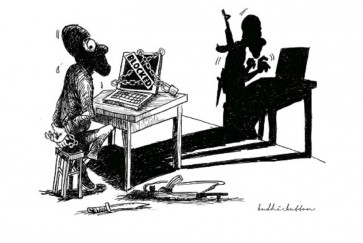Popular Reads
Top Results
Can't find what you're looking for?
View all search resultsPopular Reads
Top Results
Can't find what you're looking for?
View all search resultsState fails our cyber right to safe public space
Such understandings have not found a place in Indonesia’s internet ecosystem, as the government is becoming more conservative in dealing with cyberspace.
Change text size
Gift Premium Articles
to Anyone
F
rom the Holocaust to Rwanda’s deadly Hutu-Tutsi conflict, and to today’s alleged social media-incited genocide in Myanmar, the state has claimed a primal role in technology abuse.
The internet shutdown in Papua is probably the best contemporary example of this challenge to civil liberties, which global communities are striving to preserve in this digital age. The internet is less safe when entrusted to the government.
The nearly three-week shutdown in the provinces of Papua and West Papua mirrored a similar measure applied to some parts of Jakarta on May 22-25, and reflects the government’s incompetence in comprehending the internet society we all live in today.
As implemented in Sri Lanka and India, the “internet cut-off” policy applied to the Papuan network was apparently implemented to tackle fake news and disinformation; in fact, it showed the true face of state repression over cyberspace.
Not succeeding in dealing with the problem, the government is chasing human rights defenders for actively engaging in public advocacy against multiple human rights violations in Papua and West Papua.
Using open-source intelligence to map interactions in Twitter, BBC open-source investigator Benjamin Strick spotted irregularities from bots that spread pro-government propaganda in West Papua.
His findings also revealed that a range of interlinked social media accounts were utilized in generating a shared information flow to convey pro-government messages through videos, texts and images Earlier, the Indonesian Military (TNI) caused public outcry when its social media accounts posted misleading information along with a now-removed video titled “We love Papua” that was shot along the Indonesia-Timor Leste border.

















